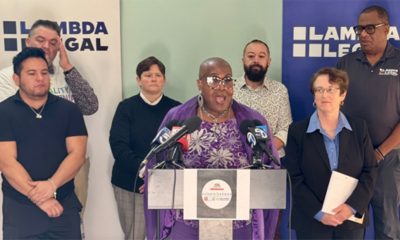AIDS and HIV
Seeking truth in the war on the coronavirus
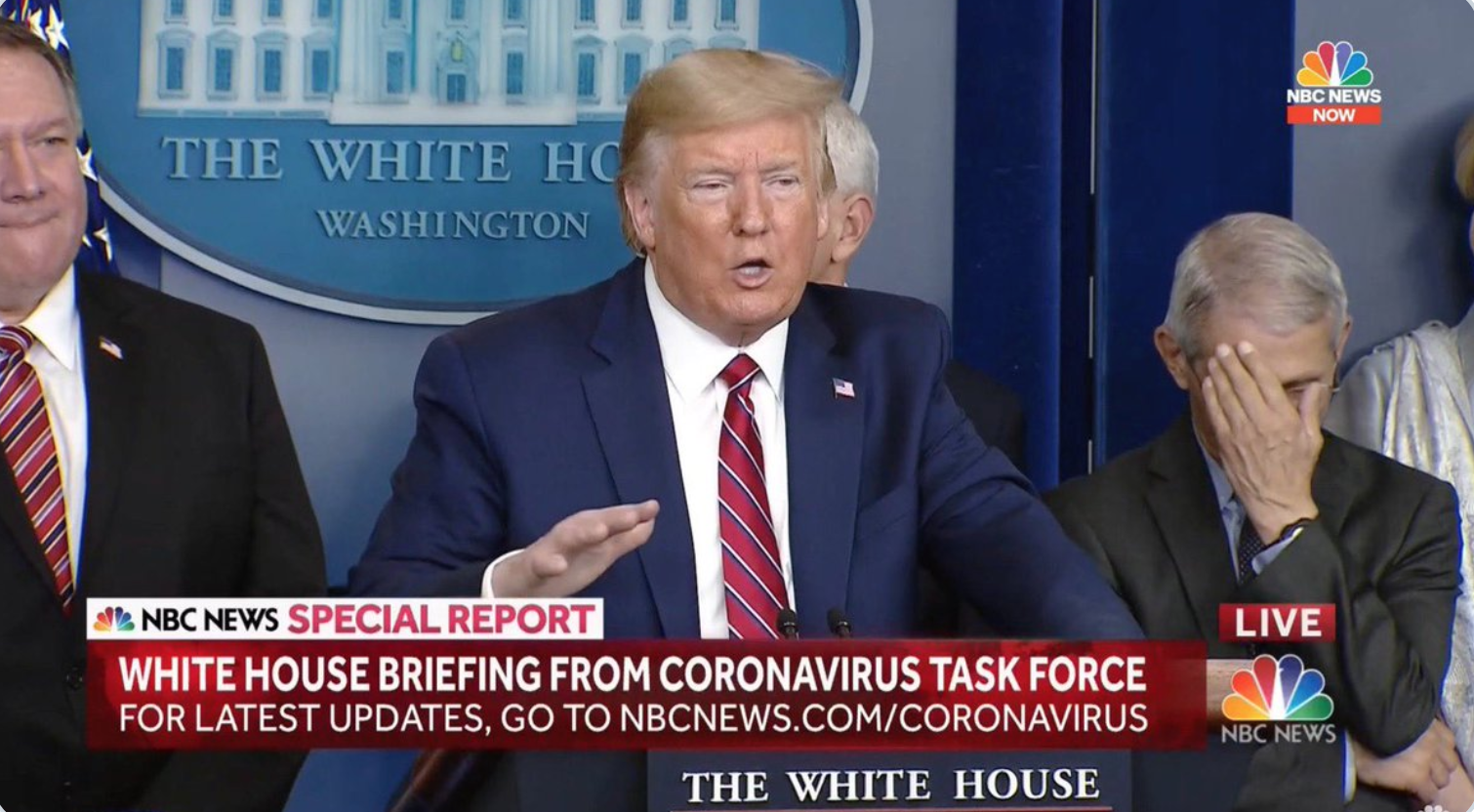
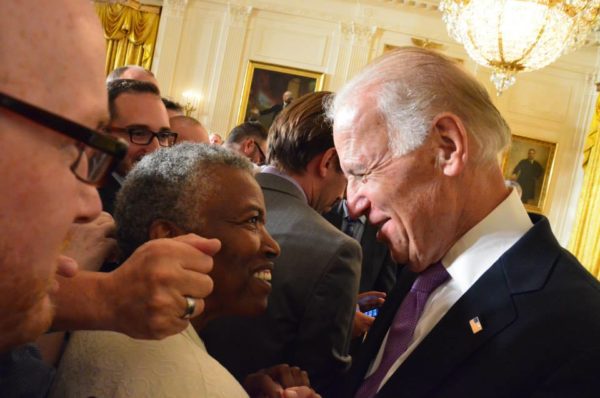
Jewel Thais-Williams said she’d call back. She was on the other line and had been inundated with calls asking how she was doing after eye surgery. Three hours later, the almost 81-year-old LGBTQ icon was pumped, angry, going on and on about conspiracy theories – how “The Eyes of Darkness” had predicted the coronavirus in 1981 and how Donald Trump was using the virus or COVID-19 to spread fear and hate for his own political gain, just like in “The 9th Wave,” a book she read as a 12-year-old that still haunted her. The book is about political machinations that “frighten old people about having what they have now taken away that they vote for this guy.”
And while one eye was patched from surgery that day, the other one was fixed on cable news as President Trump declared a state of emergency.
“How do we really know what’s going on without having tests to let us know?” Jewel asked insistently. And without widespread testing to know if the virus is real and who’s got it where and telling everyone to be afraid and shelter in place and not to have gatherings of more than 10 people, she added, “there are no more protests and law enforcement can just arrest people on the spot.”
“This is happening to keep Trump in office,” Jewel said flatly. “Follow the money. We could have had pop up clinics by now. We could have converted Mobile HIV Testing vans to do coronavirus testing. But instead, Trump meets with bankers and other money men. What’s the alternative motive here?”
It was Tuesday night and former Vice President Joe Biden was cruising to victory in three more Democratic primary states. Jewel was watching that, too. She’d switched from Elizabeth Warren to Michael Bloomberg, then back to Warren but was now fully onboard with Biden.
“He’s the same decent, honest guy who looked me in the eye when we were talking,” she says, recalling their meeting at a White House Pride party. “Eyes are the window of the soul and that was the biggest thing between me and Joe – the dude is real. That’s what I see.”
The phone call ended agreeing to disagree about conspiracy theories. But the next day, March 18, Trump took to the White House podium and insisted that the virus came from China, so it is “the Chinese virus,” a term he declared is “not racist at all.”
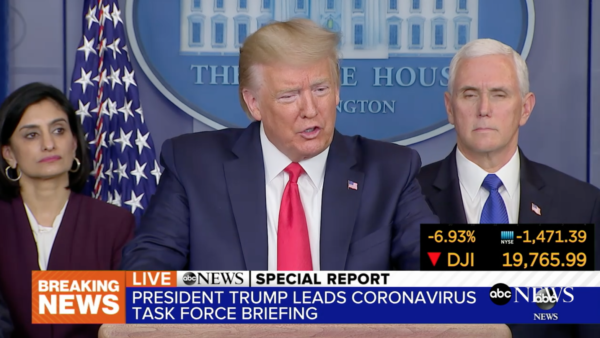
Trump – a man who used “bone spurs” as an excuse to avoid service during the Vietnam War – also declared himself a “wartime president” in this war on the coronavirus, saying he was invoking the Defense Production Act “in case we need it.”
The Korean War-era law enable presidents “to take extraordinary action to force American industry to ramp up production of equipment needed for national security,” according to Time.com.
Knowing Trump listens to right-wing conspiracy theorists, it looks like Jewel Thais-Williams’ network of sources may not have been that far off. The plot of “Eyes of the Darkness” involves a Chinese military lab that manufactures a deadly virus in Wuhan city. Snopes confirmed the book passage but debunked the prediction of the virus.
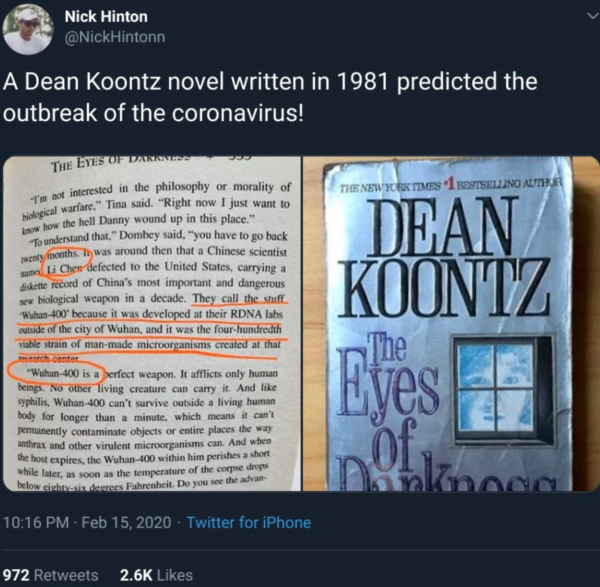
Eerily, however, this theory feels like it could hatch into something akin to the fabricated “weapons of mass destruction” fiction that had America launch a first “Shock and Awe” strike against a foreign country and start the war against Iraq. In fact, Axios reported March 21, that U.S.-China tensions hit a dangerous new high, worrying many.
Meanwhile, a website called “Stop AAPI Hate” has been launched in the Bay Area to document hate crimes against Asians Americans and Pacific Islanders, including a Los Angeles boy attacked at his middle school. “We are currently providing support to a child who had to go to the emergency room after he was assaulted and accused by bullies of having the coronavirus, and so that tells us we may need to work with schools to address shunning and school bullying but we need to know how widespread it is,” said Manjusha Kulkarni, executive director of A3PICON, told NBC/Bay Area.
The bottom line: with a president who consistently, boldly and unabashedly lies for his own self-aggrandizement, how is the American public supposed to believe anything Trump says – about anything, let alone a very real new virus that is claiming thousands of lives across the globe?
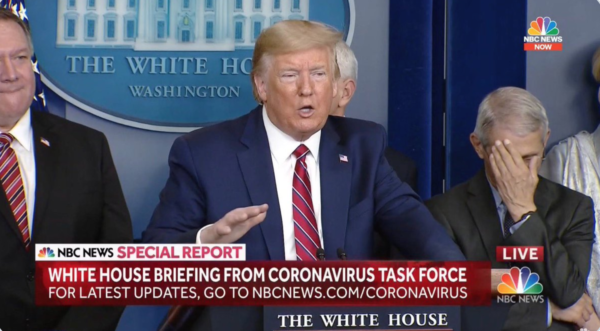
All the respected experts say “test, test, test” to find out where the virus is being spread. But the administration has failed on every front: containment is no longer applicable and mitigation is voluntary, though with Gov. Newsom’s official Order to stay home, law enforcement will now be looking for violators, according to the LA County Emergency Operations – but what happens next is unclear.
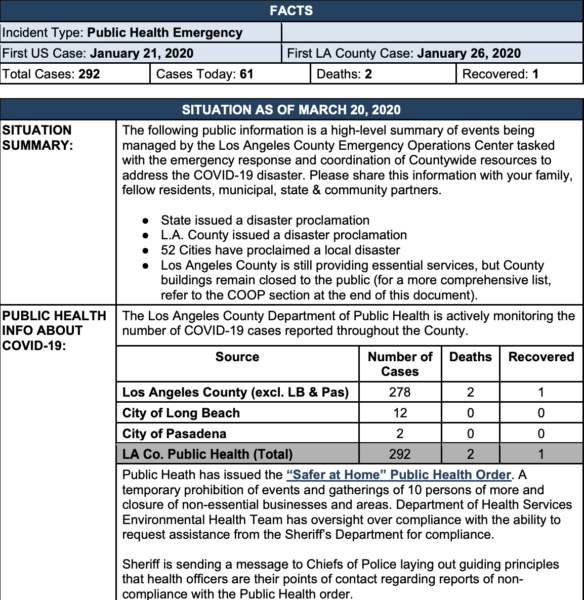
And yet, the American people themselves seem to be taking on the historic and mighty task bungled by the Trump administration, helping each other and helping non-profits help others, as well, such as volunteers showing up for Project Angel Food to prepare and deliver food to homebound people with life-threatening illnesses.

“Charity is often a vital first line of defense or the critical resource of last resort for families that struggle with food insecurity in America. It is, however, inadequate to meet the daily needs of 40 million Americans who are food insecure,” Abby Leibman CEO of MAZON: A Jewish Response to Hunger, tells the Los Angeles Blade.
“The Federal Government has the most crucial role in ensuring that people have access to adequate resources to feed themselves and their families through its nutrition safety net programs, particularly SNAP. Even at the best of times those resources are stretched thin and in this time of crisis, they are getting further stretched just as they become more vital. The current Administration has done everything in its power to DECREASE access to these benefits, in a shameful response to people who have been struggling and those made newly food insecure by the pandemic,” she says.

Empty grocery shelves (Photo by Karen Ocamb)
“Those who are more vulnerable, face even more barriers, particularly seniors, including LGBT seniors which is why MAZON funded a soon-to-be-released study with the Williams Institute to look into the matter of LGBT senior food insecurity,” Liebman says. “For them, issues of stigma, lack of family support, lack of access to traditional employment and its benefits, drive far too many into poverty as they age. Our Federal Government can do better, it must do better.”
Food and hunger are issues everywhere. Bamby Salcedo, founder and director of TransLatin@ Coalition, says she is still continuing the organization’s lunch program, but limiting other services.
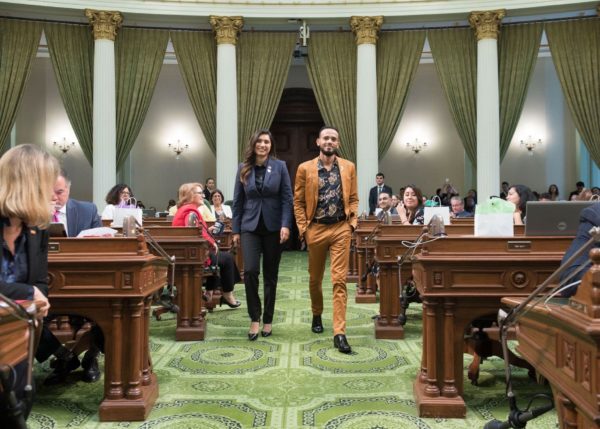
TruEvolution CEO Gabriel Maldonado being honored by Assemblymember Cervantes and the California LGBT Legislative Caucus last June in Sacramento. (Photo via Maldonado’s Facebook page)
TruEvolution CEO Gabriel Maldonado says his organization has been hit hard.
“TruEvolution has canceled our all of our community and educational events for the next until April 15, 2020. We are going to re-evaluate any events taking place subsequently at that time. In addition, our strongest HIV testing partner, UC Riverside, has either postponed or canceled all campus events, including our HIV testing events,” he tells the Los Angeles Blade.
“We are very much concerned about the impact that this will have on our organization’s ability to provide services, and outreach to our clients,” Maldonado says. “Many of our clients rely on our storefront services for food, housing, and support groups. We are suspending our drop-in hours and will be providing virtual or appointment-only services. Last night, we had a client contact us at 2:00 AM who lost his job and was sleeping in his car as of this week. Much of the paperwork must be done and completed in-person and we also need to meet with him to successful link him into emergency housing. Business must continue. Clients have the same issues before the pandemic, and both social and medical services are even more critical now than before.”
Maldonado says the organization will be offering “walk-up services” during their support group hours and will be providing our clients with a hot meal, water, sanitizer, county resources and FAQs on COVID-19.
Still, confusion reigns.
“This is serious. We have an emergency,” trusted Rep. Maxine Waters told MSNBC. “We have a real serious problem with testing. First of all, we have so many people who need testing who can’t get testing.”
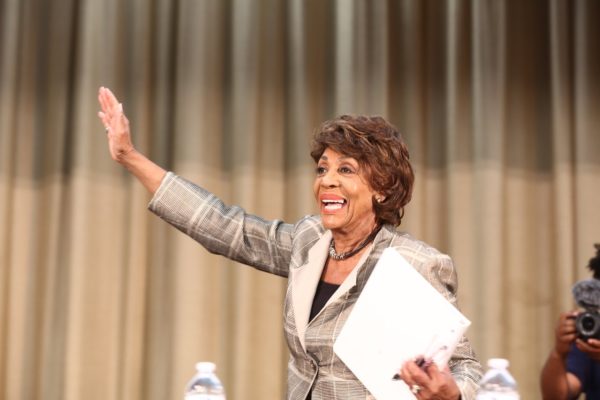
Waters, a political powerhouse and the first woman and first African-American Chair of the House Financial Services Committee, is a longtime LGBTQ ally, having been in Los Angeles and elected to Congress during the Second Wave of AIDS. The story she told MSNBC is akin to thousands of other stories of people or friends of people who have been sick or frightened and looking for help, found none. Her friend, at least, has powerful friends.
“I have a friend that I happened to call today,” she told MSNBC on March 13, “and she had gone to UCLA after having real symptoms. They gave her a test for influenza and then told her she didn’t have influenza. And she said, ‘What about the coronavirus tests?’ And they said they were not giving that test. She called a friend who has great influence and they told her to stay there, don’t leave,” Waters said.
“And this friend with great influence at UCLA forced them to give her the test. So, they gave her the test, but they couldn’t give her the results in any short period of time. So, they sent her home,” Waters continued.
“When I talked to her at home, she was in great pain, had terrific headaches, coughing and a fever. And she was waiting on the results from the test that they had been forced to give her at UCLA.”
Waters paused. “I don’t know what’s happening. I’ve got to check back to see if she ever got the results of that test,” she said. “But I do know this: she and her daughter are basically alone and I had to inquire about – did she have food in the house, or what was going on? She said someone was going to bring some food and leave it on the doorstep.”
This, Waters says, “is a situation, I think, that is typical of what is happening in this country. Unfortunately, we were not prepared. The greatest country in the world was not prepared for this pandemic.”
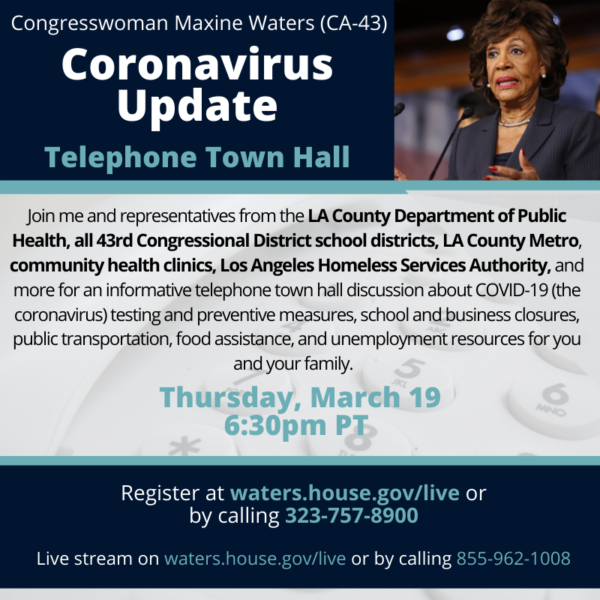
Not unexpectedly, having dealt directly with the Trump administration, Waters knows many people do not trust Trump.
“One of the problems that we have is that there’s not a lot of trust from the average American in the president of the United States,” she says. “Unfortunately, he has been documented to have lied so many times, to distort, to change the story.”
But lack of credible leadership results in real harm to real people in real time – and that time is now.
“I am worried about people with low income and the minimum wages that are going to be stopped from work. They’re not going to have jobs. They’re going to be fired. The business is going to close down, and they don’t have anywhere to go,” Waters says. “So, we’ve got to make sure that for those who do have unemployment insurance, that we expand that and that is what is being looked at….We’ve got to make sure that we give additional support to Medicaid and that was being proposed….So, we’ve got a lot of work to do.”
Another political powerhouse who is also a strong friend to the LGBTQ community is Rep. Adam Schiff, who represents Burbank to West Hollywood. As the leader of the House Impeachment committee, he has been getting very real death threats. Now he is facing another threat and is practicing the recommended “self-isolation” at home with his family after his lead investigator, counselor Daniel Goldman, recently tested positive for the coronavirus.
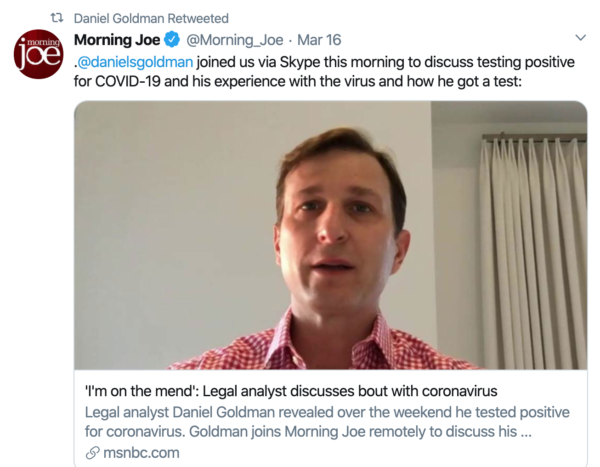
“I would be taking precautions anyway to limit my social interactions,” Schiff tells the Los Angeles Blade in a phone interview. “First, we began canceling large events, and then we began canceling smaller events, doing constituent meetings by phone instead of in-person. I scaled way back on my travel plans, and I think we had to cancel all of my constituent meetings before the situation with Dan, but I’m taking some additional precautions,” he says, adding that Goldman was likely infected after he left Schiff’s office in early March. “But out of an abundance of caution, we’re still being careful.”
At a tele-townhall on March 19, Schiff said he completed his self-isolation and has been working on getting relief for freelancers in the entertainment industry, in particular. He spent most of the call discussing testing, financial relief for unemployed and small business owners, including the prospect of forgivable loans.
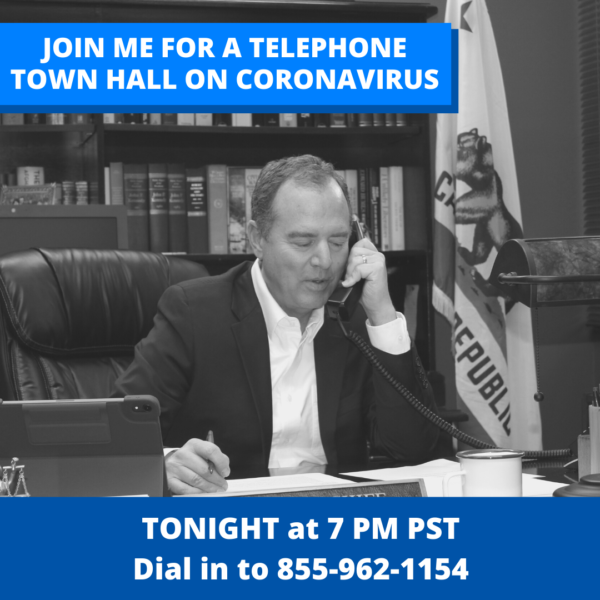
“We’re going to be looking at what’s necessary so that people who cannot make their rent payment or their mortgage payments or have some kind of suspension – and also to make sure that none of this effects people’s credit in the long run because this is a pandemic that’s effecting us all, no matter how good someone’s planning may have been. We’re all in this boat together.” Schiff said.
“The main point in the stay home requirement is not so much because food is somehow limited or we need to ration but rather we want to make sure that people don’t unnecessarily expose others to the virus. The whole point there – and this gets to the expression these days about ‘flattening the curve’ – if we can slow down the progress of the virus, it means that our hospitals will be able to deal with the intake, that they can get through the current shortages of protective gear, that they can get through the current lack of sufficient numbers of ventilators. If, on the other hand, we don’t take these rather extraordinary steps, then we’re going to have an explosion of cases, our healthcare system is going to be inundated, there won’t be enough ventilators, for example, to go around, and there will be an unnecessary loss of life. And that’s really the point of social distancing, the point of staying home.”
Schiff will be holding another tele-townhall on March 26, details of which will be posted on his website and Facebook page.
As have many others, Schiff has noted the oddity of having Trump onstage with Vice President Mike Pence [who finally submitted to testing with his wife on March 21 after a staffer tested positive] clumped together with his coronavirus team for photos and television – and not exhibiting the social distancing of three-to-six feet they insist on for others.
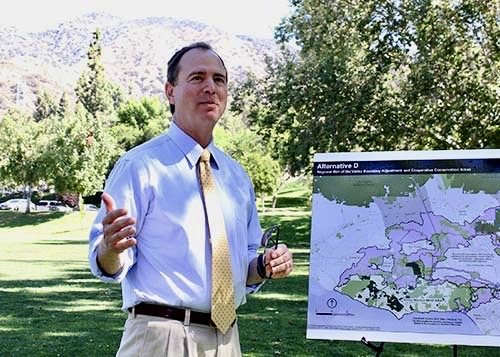
“It is incongruous to hear the president talk about social distancing while he’s not social distancing. And people are standing around him and he’s leaning over to whisper to Mike Pence,” Schiff tells the Los Angeles Blade.
“There’s kind of a conflicting message, especially with what we’re saying. But it is certainly important to note that the degree that we are able to take precautions now and do sensible social distancing will significantly flatten the curve at which this virus spreads and help protect those with compromised health, or seniors.”
The significance of social distancing, especially with news that the infection can be spread “silently” by people who are asymptomatic, is that individuals must accept responsibility for themselves and prevent serious health consequences that could end up costing a lot of people their lives.
“So here, the public is really empowered to do something major to affect the severity of this crisis by taking some important steps that are going to be difficult for people,” he says. “We’re a social creature and we like going out to restaurants, and we like joining in public places and now we’ve been asked to move away for a period of time. So, things are moving very, very quickly, and steps that we thought were aggressive two weeks ago now, it’s been way too… It’s substantial. And who knows where it will be tomorrow.”
Schiff also took on some more precise question from the Los Angeles Blade on behalf of community agencies regarding the lack of testing, who’s paying for what and housing issues.
“There’s no question that the failure to test early and often has been the single biggest failure in the Administration’s response to this virus, and it’s inexcusable because we knew about it for weeks ahead of time,” Schiff says. “When we emerge from this crisis, the disastrous lack of any testing of patients in the first weeks of this outbreak will need to be the topic of major congressional oversight. Testing is becoming more available, though not fast enough, and it’s currently reserved for patients that are symptomatic and/or were exposed to an individual that has tested positive for the coronavirus.
“As of March 17, the testing capacity in California was 8,000 per day,” he says, noting the passage of the Families First Coronavirus Response Act, which Trump signed into law March 19. The law makes testing “free for all Americans — and we will continue pushing to increase our testing capacity by getting more tests into production so they will be more widely available. Americans have been fighting blind because of the lack of tests, but I’m hoping this changes immediately.”
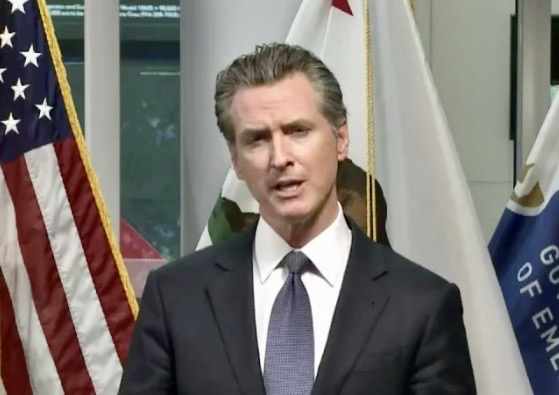
Darrel Cummings, Chief of Staff at the LA LGBT Center, asked questions via the Los Angeles Blade before Gov. Newsom issued his Stay at Home Order on March 19.
Cummings notes “community health centers have a role to play with both their current, registered clients and among the communities where there are located. To effectuate ‘social distancing’ within clinical settings, telemedicine helps but is not always a billable service. Will you advocate with HRSA so that telemedicine can be billed the same as an in-person visit? The same question applies to mental health and psychiatry visits.”
“Yes,” Schiff says. “Telemedicine has an increased role to play as we try to minimize visits to clinics or hospitals, especially for at-risk patients. The emergency appropriations legislation Congress passed two weeks ago lowered the barriers for telemedicine reimbursement for Medicare patients, which is a good start, but we need to do more. California has asked the federal government for a waiver that would allow reimbursement to community health clinics for telemedicine visits at the same rates as in-person visits, and that is currently pending,” he adds. “I fully support moving as much diagnosis and treatment as we can online right now, because it’s safer for patients and doctors alike, and reduces demand on medical resources.”
Schiff also noted that the Community Clinic Association requested a national emergency declaration so they could be reimbursed for telehealth services. “Given President Trump’s recent declaration, Medicare is reimbursing for telemedicine, but Medicaid reimbursement remains an important issue,” he says, adding that the California Department of Health Care Services sent a request to CMS that would allow telehealth/virtual visits amongst other Covid-19 emergency responses in Medi-Cal. Once that is approved, California can send Medi-Cal dollars to clinics for telehealth.”
Additionally, to help with social distancing and keep clinics a safe area, community health centers have begun pre-screening patients for flu-like symptoms before they enter a facility and are encouraging patients to come in only when necessary.
“Clinics that serve particularly vulnerable populations like the LA LGBT Center, which sees a large immunosuppressed population, will rely on telehealth to help keep their patients safe,” Schiff says. “Drive-through testing has become available at some locations in Northern California to limit potentially infected people from coming into hospitals. I am hopeful drive-through testing will continue to become more widely available, but there is a limitation due to the lack of tests.”
What about support and guidance for organizations that provide housing or services for the homeless, or supportive/affordable housing and for the homeless population in general?
“Our homeless population faces a significant risk to contracting Coronavirus, and the city and state are beginning to step up,” Schiff says. “Gov. Newsom announced that homeless persons would be prioritized as a vulnerable population and the city is beginning to deploy resources directly to the homeless population where they are. But the federal government must also do more and I am advocating that federal assistance for the homeless be dramatically increased –both to deal with the broader epidemic of homelessness, but particularly the unique health risks now presented to this population. Much more must be done, and drastic steps to get people off the streets to create social distance may be necessary.”
AIDS Healthcare Foundation has offered recently purchased 74-room motel that has not yet been leased out as temporary housing for coronavirus patients.
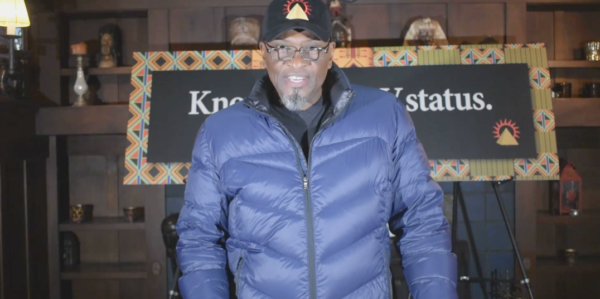
Jeffrey King, founder and executive director of In The Meantime Men, is very direct, raising the issue of having sex during the coronavirus pandemic.
“The coronavirus has us all making major adjustments in our lives,” King says in a video posted on his Facebook page. “I want to encourage you to stay connected, and to consider your risk. Many of us are still engaging in sex. Our sex clubs and gay-specific social venues are closing now. Our social dating apps, however, are in full effect. Again – I want you to consider your risk and to act responsibly.”
King shares information provided by the Commission on HIV in Los Angeles County for individuals living with HIV and their possible concerns regarding the coronavirus.
The Commission advises, in part:
“The novel coronavirus is understood to spread mainly from person-to-person through respiratory droplets when an infected person coughs or sneezes, or when a person touches a surface with these droplets and then touches their eyes, nose, or mouth. Common symptoms in a person with the novel coronavirus infection include fever, dry cough and shortness of breath or difficulty breathing.
“Persons living with controlled HIV (i.e. normal CD4 count and undetectable viral load) do not appear to be at greater risk than the general public for either acquiring or becoming ill with the coronavirus.
“Persons living with HIV, however, may be at increased risk for an adverse response to the infection if they have: Low CD4 cell counts, particularly under 350 cells/ml (considered not virally suppressed and therefore at higher risk); 60 years of age and older; heart, lung, or kidney disease; other poorly managed health conditions, including hypertension and diabetes.
“Public Health recommends that individuals at higher risk for serious illness associated with COVID-19 take the following actions and precautions: Practice regular hand washing (20 seconds with soap and hot water);
“Cover your cough or sneeze with a tissue, then throw the tissue in the trash and wash your hands. If you do not have a tissue, cough or sneeze into your elbow; Have a 30-day supply of all medications; Remain fully adherent to all regularly prescribed medications; Make sure all your vaccinations are current, including against influenza (“flu”) and pneumonia;
“Practice social distancing (this means limiting the time you spend in public and keeping a 6-foot distance between yourself and strangers when you are in public); Stay home if you are even mildly sick; Call your health care provider before seeking medical care so that appropriate precautions can be taken.”
King is pointed and non-judgmental in his Facebook video. “As we engage in sex, I want you to consider the choices and the decisions you’re making as mature adults and to be as responsible and to make sober, conscious decisions. We got this,” he says.
“Many of us have lived through traumatic pandemic experiences to include the introduction of the AIDS virus to America and the Black community,” King tells the Los Angeles Blade. “We will be able to rise above the fear of the unknown relative to this new man-made viral construct we now call the coronavirus. The question remains: will we ever end the coronavirus?
“In The Meantime has cancelled its annual scholarship fundraiser, halted its mobile HIV testing efforts, and we are implementing an amplified sanitation protocol at our facility,” he says. “We will continue to show up for our clients hosting smaller groups implementing social distancing.”
But the too-familiar refrain remains: what’s happening? What’s true? What are the facts? Who can we trust as we bounce between one conspiracy theory and another?
California’s LGBTQ community leaders are striving to be of service and trusted elected leaders are diligently upholding their oath.
Criminal defense attorney and West Hollywood City Councilmember John Duran, for instance, has been posting daily briefings on his Facebook page.
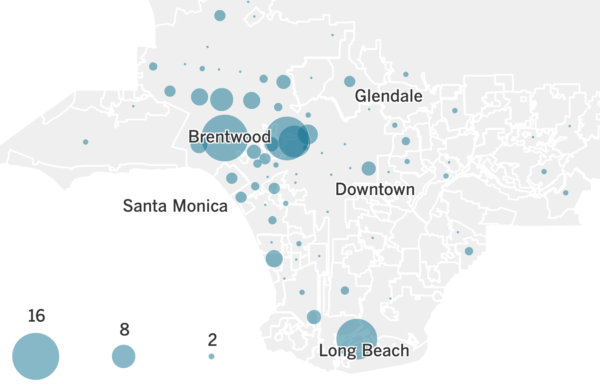
Map via the LA Times coronavirus tracker
After LA County released new data showing demographics and location for coronavirus cases, on March 21, Duran posted his assessment, which reads, in part:
LA County cases: 292 (up from 231)
LA County deaths: 2 (up from 1)Demographics to date:
Children – 4 cases
Ages 18-40 – 72 cases
Ages 41-65 – 82 cases
Over age 65 – 34West Hollywood cases – 15
Brentwood cases – 16
Long Beach – 12
Melrose district – 11
Encino – 8
Hollywood – 7
Sherman Oaks – 6
Pacific Palisades – 6
Beverly Hills – 5
Manhattan Beach – 5
Those are the top numbers in LA County. WHAT? HOW IS THAT POSSIBLE? HOW CAN IT BE THAT THESE COMMUNITIES HAVE MORE REPORTABLE CASES THAN THE OTHER DENSE PARTS OF THE COUNTY LIKE DOWNTOWN, KOREATOWN, HUNTINGTON PARK?
First – the Los Angeles County Department of Public Health is saying – it doesn’t matter. There are no “safer” or “more dangerous” parts of the community.
But remember – these stats are cases reported today – but likely infected one or two weeks ago. And remember that anyone infected today – won’t be reported until one or two weeks from now.
OR NOT TESTED AND REPORTED AT ALL. NOT REPORTED AT ALL.
LA County is now advising doctors to give up on TESTING patients in the hope of containing the virus. Doctors are being told to only test patients if a positive result could change how they would be treated.
The numbers showing the communities with the highest number of reported cases are places where people have a bit more income, a bit more education and a bit more aggression (?). Look at that list once again. Those are places where individuals and communities tend to have the resources and the aggression to get results.
And they did.
Look at the age demographics also. The highest number are neither the very young or the very old. They are the age ranges where people would tend to be working and have access to health care and testing. There are many different lenses to look at data and think about it.
BUT IT DOES RAISE THE QUESTION – SHOULD WE BE THINKING ABOUT THIS AT ALL RIGHT NOW? I say no.
Remember how during the discussions about earthquakes we were warned that for the first three days after the cataclysm – you were on your own while government was gearing up with a response. You had to be self reliant and self sustaining.
Well – this cataclysm – is still shaking. It hasn’t stopped yet. We are on the front end of the cataclysm not the aftershocks. When the big quakes hit – how many of us are thinking at that moment – but what about my rent? My job? My future? NOPE. The only question in that moment is AM I GOING TO SURVIVE THIS?
That’s where we are. In the midst of the shaking.
There will be a time in a couple of weeks (hopefully when the shaking has stopped) to worry about the rebuild and cleaning up the mess. THAT IS NOT NOW.
NOW – is about isolating and minimizing social contacts until the Shadow passes. That is all for now. We will have lots of work to do on the other side of the initial hit. And we will work together on that when the time is here….
80% of those of us who get exposed to COVID 19 will experience mild to moderate symptoms. It will infect and pass through us and our bodies will create antibodies.
Pray and focus on the other 20% who may need ventilators, hospital beds and treatment. And the possibly 2-3% who may die.
But in the meantime, try to stay in the group called DIDN’T get exposed to COVID 19 in this first wave of cataclysm because I isolated, washed my hands and kept social distancing. I know it’s only the first week of interruption and already we are all feeling restless. But remember –
WE ARE STILL IN THE SHAKING. BRACE YOURSELF. DUCK AND COVER. AND WAIT FOR THE SHAKING TO STOP.
The clean up and rebuild will be for another day and time.
Onward! Until the next indicated step…..”
In her weekly newsletter, LA County Supervisor Sheila Kuehl explained why the county took such a difficult decision to issue the “Safer At Home” Order, along with the City of LA and she offered some advice:
“There are a number of creative ways to cope and they are important for our health and sanity: have an indoor scavenger hunt, work out by watching your gym or others on tv, read one of those many books you bought and put aside, walk around the block (keeping six feet away from everyone—just smile and give virtual hugs and high fives), call someone you haven’t talked to in a while (the former President of the CA Senate, John Burton, who was my seatmate in the Senate, called me out of the blue last night just to talk), dig up that old Monopoly set and buy Park Avenue, and, of course, keep informed.
For lots of up-to-date, accurate information about COVID-19 in LA County, regularly visit lacounty.gov/covid19.
Thank you all for everything you’re doing, and you can bet I will continue to send updates as they come in.
Together, we can get through this by doing our part to “flatten the curve”.
As Hill Street Blues Sgt. Esterhaus used to say, “Hey, let’s be safe out there!””
And, as Gov. Newsom tweets:

AIDS and HIV
From ACT UP to apps: A candid conversation with MISTR founder Tristan Schukraft
As HIV prevention ushers in a new era, Schukraft reflects on the evolution of sexual healthcare and the power of stigma-free prevention

It was not too long ago that an HIV diagnosis was read as a death sentence. In its earlier decades, the HIV/AIDS crisis was synonymous with fear and loss, steeped in stigma. Over recent years, open conversation and science have come together to combat this stigma while proactively paving the way for life-saving treatments and preventive measures like PrEP. Now, in 2026, with discreet and modern platforms that meet people where they’re at in their lives, HIV prevention has evolved from hushed words of warning into something far more sex-positive and accessible. Game-changing services like MISTR are a testament to this shift, showing our community that healthcare doesn’t have to feel clinical or shaming to work. It can be empowering and, dare I say, celebratory.
Few people embody this evolution quite like Tristan Schukraft, founder of MISTR. With one hand in healthcare and the other high-fiving through queer nightlife, Schukraft gets that, from the bar to the bedroom and beyond, prevention happens in person and in real life. His approach has helped turn PrEP, DoxyPEP, and testing into normalized parts of our daily queer life, reaching hundreds of thousands of people across the US.
In our conversation, Schukraft shares candidly about stigma, policy, and why the future of sexual health depends on keeping it real.
You have one hand in healthcare and the other in nightlife and queer spaces. Can you share with us how these two spheres impact and inform each other? How do they impact and inform you?
Honestly, for me, they’ve never been separate. Nightlife and queer spaces are where people meet, date, hook up, fall in love, and make friends. That’s real life. Being in queer spaces all the time keeps me grounded and reminds me who we’re building MISTR for.
MISTR markets sexual health in a sex-positive, stigma-free fashion. Can you share with us how you measure the impact of this approach?
This year, we held the first-ever National PrEP Day. Dua Lipa performed, and Cardi B was there. After the event, Cardi B went on her Instagram live to encourage people to sign up for PrEP.
When you make sexual health stigma-free and sex positive, people talk about it. We see it in how people use the platform. When 700,000 people are willing to sign up, get tested, start PrEP, and add things like DoxyPEP, that tells us we’ve made it feel safe and normal instead of scary or awkward. And then we see it in the results. Since we expanded DoxyPEP, STI positivity among our patients dropped by half.
How have you seen the conversation of sexual health in our LGBTQ+ community change in mainstream culture in recent years?
Ten years ago, nobody was casually talking about PrEP, and if they did, it likely referenced one being a Truvada whore. Now it’s part of the culture. Popstars like Troye Sivan post pictures of their daily PrEP pill on social media. Cardi B goes on Instagram Live telling people to get on PrEP.
For many sexually active gay men, taking PrEP is simply part of the gay experience. For people in more remote areas, it might not be as talked about. Particularly in rural or more conservative places, MISTR can be a life-changing option. No awkward visits to the family doctor or the local pharmacy where everybody knows your business. It’s all done discreetly online and shipped straight to your door.
You have publicly argued that cuts to government HIV prevention funding are of high risk. Would you please elaborate for us on what those budget decisions mean on an individual level?
It means real people fall through the cracks. Someone doesn’t get tested. Someone waits too long to start PrEP. Someone finds out they’re HIV-positive later than they should have. Community clinics will be the hardest hit, especially those in underserved communities. The good news is that MISTR is ready to help people who might lose their access to care. All you need to do is sign up at mistr.com, and it’s totally free with or without insurance.
From your (and MISTR’s) perspective, how do these funding cuts threaten ongoing efforts to end the HIV epidemic?
For the first time, we have all the tools to end HIV. If everybody who is HIV negative is taking PrEP and everyone HIV+ is virally suppressed, we can end all new HIV transmissions in the United States. We have everything we need today. All we need is to get more people on PrEP. Cutting funding risks losing that momentum. Ending HIV requires scale and consistency. Every time funding gets cut, you lose momentum, trust, and infrastructure, and rebuilding that takes years.
HIV transmissions don’t pause because budgets change.
In our current climate of decreased federal investment, what role do you feel private healthcare and business should play in sexual health?
With reports that the current administration is considering cuts to HIV and prevention funding, we face a moment of reckoning. At the same time, some employers are seeking to exclude PrEP and HIV prevention from their coverage on religious freedom grounds. If these challenges succeed, and if federal funding is slashed, the consequences for public health will be devastating. But this is where the private sector must step up to fill the gap, bridge divides, and deliver results.
Businesses have the power and platform to normalize HIV prevention and drive measurable outcomes. At MISTR, we see firsthand what’s possible: since introducing DoxyPEP, STI positivity rates among our patients have been cut in half. But it’s not just about medication. It’s about messaging.
Our sex-positive, stigma-free marketing speaks directly to our community, making sexual health part of everyday life. No awkward doctor visits, no needles, no paperwork — just free online PrEP and STI testing, prescribed by real physicians and delivered to your door. That kind of impact could grow exponentially if more employers embraced this approach and made HIV prevention part of their employee wellness programs.
Employers, this is your call to action. Start by making sure your health plans cover PrEP and DoxyPEP. Partner with platforms like MISTR to give employees private, stigma-free access to care. Offer on-site testing. Talk openly about sexual health, not just during Pride, but every day of the year. This is not political — this is about protecting lives, strengthening communities, and building a healthier, more productive workforce. Because healthy employees aren’t just good for public health — they’re good for business.
When the private sector steps up, outcomes improve. And when businesses align with platforms like MISTR, scaling impact isn’t just possible — it’s happening.
Has MISTR experienced any direct effects from these recent shifts in public health funding?
MISTR’s unique model is totally free for patients with or without insurance, and we don’t cost the government or taxpayers a penny. We are scaling up our efforts to reach people who might be losing their access or care.
What would be your message to policymakers who are considering further cuts to HIV/AIDS programs?
During his first term, President Donald Trump committed unprecedented resources to the Ending the HIV Epidemic initiative here at home. Bipartisan support has shown what’s possible when bold leadership meets smart strategy. To policymakers: I urge you to reconsider any cuts to HIV prevention funding. This is not the time to pull back. It’s the time to push forward. Ending HIV is within reach — but only if government, private industry, and community organizations stand together.
What is one perhaps overlooked win from last year that impacted you on a personal level?
Seeing our STI positivity rate drop by half after expanding DoxyPEP.
Looking at the year ahead, what are MISTR’s most significant priorities for sexual health in 2026?
Expanding access, especially in the South and in communities that still get left out. Rolling out injectable PrEP. And just continuing to make sexual healthcare easier and more normal.
Is MISTR planning to integrate injectable PrEP into the mix?
Yes, absolutely. Long-acting PrEP is a game-changer, especially for people who struggle with daily pills. We’re rolling it out through a hybrid model: telehealth plus in-person injections in key LGBTQ+ neighborhoods.
As you just mentioned, MISTR reported cutting STI positivity rates in half through expanded DoxyPEP access last year (mad props). What do you think allowed you to accomplish this?
We made it easy, normalized it, and bundled it into care. No stigma, no hoops, no lectures. When you remove friction, people take care of themselves.
If you could eliminate from our collective consciousness one particular myth or stigma about sexual health, what would it be?
Sexual health should be talked about in the open, and we can have fun with it! I threw a party in October for National PrEP Day. How many parties have you been to celebrating sexual health? You should go to more.
What were the most significant obstacles or setbacks you saw some of your patients face in accessing PrEP and STI prevention services in the recent past?
Stigma, paperwork, insurance, provider judgment, and just navigating a system that was never designed for them.
Looking at the next chapter, what would you like to see MISTR accomplish next? And I have to ask, what’s next for you?
For MISTR: scale, injectables, and getting more HIV+ utilizing MISTR long-term HIV care. I started MISTR with the goal of ending HIV, so this year, next year, and as long as it takes, I want to make history and end HIV.
For me: staying close to the community, building things that matter, and making sure we never lose sight of the humans behind the metrics.
For more information, head to HeyMistr.com.
This article is part of LA Blade’s January health series.
AIDS and HIV
Community is the cure: AIDS Walk LA returns to fight HIV and funding cuts
AIDS Walk Los Angeles returns to West Hollywood on October 12 with the theme ‘Community Is the Cure,’ highlighting the vital role of unity, radical community action, and advocacy in the fight against HIV/AIDS, stigma, and government funding cuts
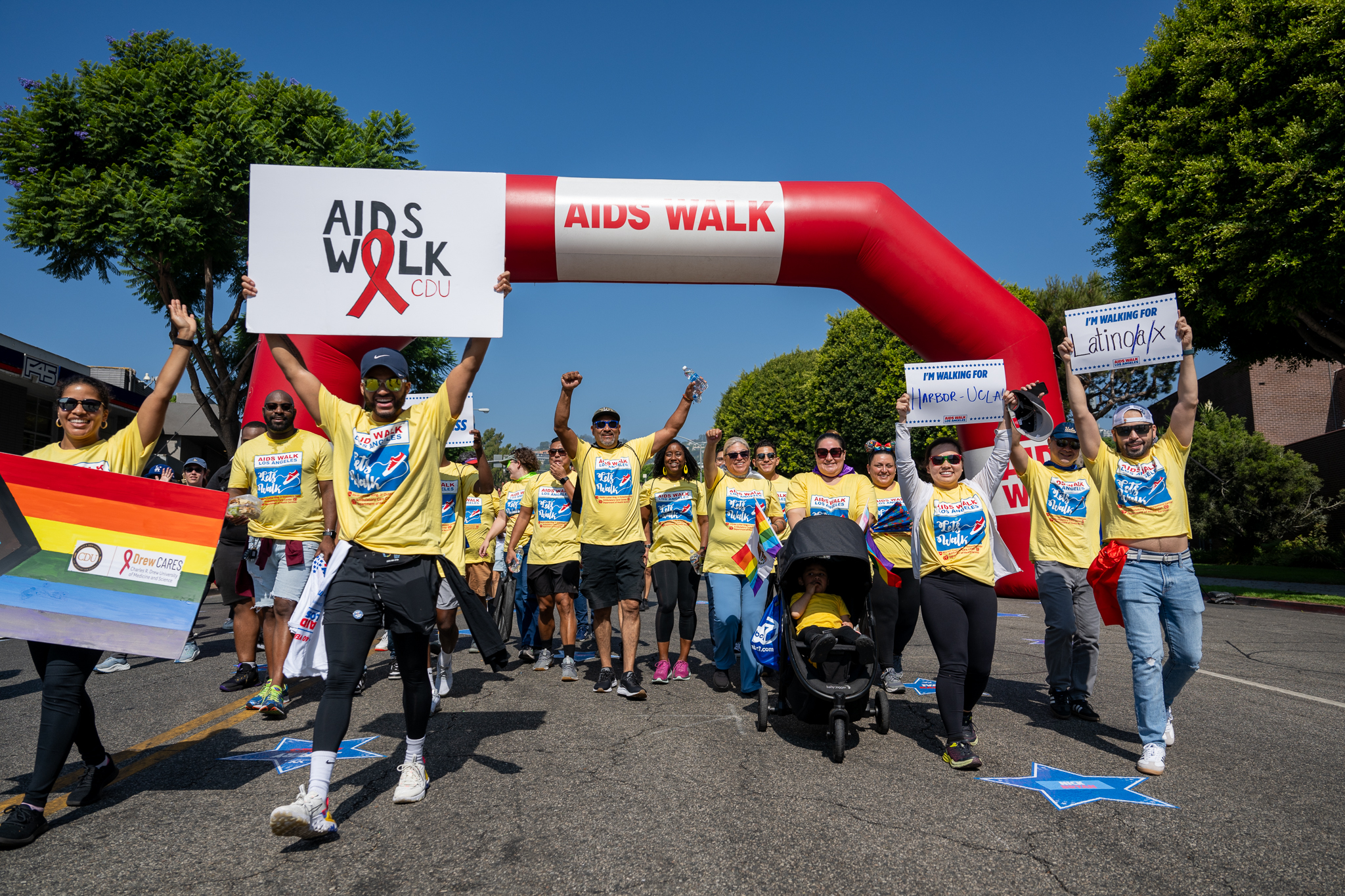
APLA Health, a nonprofit providing HIV care, prevention, and sexual health services, announced the return of AIDS Walk Los Angeles on Sunday, October 12, 2025, starting from West Hollywood Park. This year’s theme, “Community Is the Cure,” emphasizes the role of unity in advancing progress against HIV/AIDS and supporting those affected.
Walk day will feature a live performance from RuPaul’s Drag Race star Heidi N Closet, DJ sets, and community booths. Following the celebration, walkers will make their way through the streets of West Hollywood.
“This event was born out of urgency, and it’s just as relevant today,” said Craig E. Thompson, CEO of APLA Health. “We’ve made incredible progress in the fight against HIV, but that progress is under direct threat from funding cuts and political attacks. Now is the time to show that we won’t be silenced or set back.”
Since its inception forty years ago, AIDS Walk Los Angeles has grown into one of the largest HIV/AIDS fundraising events in the world, raising nearly $100 million. Proceeds fund APLA Health’s services, including HIV specialty care, sexual health services, food and nutrition support, and housing assistance.
“The HIV/AIDS epidemic has always shown us that progress happens when people come together, when patients, neighbors, families, activists, and health providers stand shoulder to shoulder. Today, with funding under attack and stigma resurfacing, unity is not optional. ‘Community Is the Cure’ is a reminder that science alone isn’t enough. We need collective willpower, advocacy, and solidarity to ensure everyone has access to the care and dignity they deserve,” Thompson said.
Cuts to Medicaid, the Ryan White Program, and prevention funding threaten access to medications, housing assistance, and food security. “Here in Los Angeles, where tens of thousands rely on these programs, even modest reductions can push people back into crisis. AIDS Walk Los Angeles helps fill some of those gaps, but philanthropy cannot fully replace the government’s responsibility,” Thompson explained.
Communities of color, the medically underserved, people living in poverty, and those experiencing homelessness are disproportionately affected. “The barriers aren’t medical. They’re structural: stigma, lack of insurance, unstable housing, and underfunded safety-net services. The administration is underinvesting in the very programs designed to break down these barriers. Until that changes, inequities in HIV prevention and care will persist,” he said.
Funds raised by the walk provide housing, groceries, case management, and access to medical care. Thompson shared the story of one patient who had lost housing and had to choose between medication and meals. “Through AIDS Walk–funded programs, we were able to connect him to stable housing, consistent medical care, and our food pantry. Today, he is virally suppressed, working again, and mentoring others who are newly diagnosed with HIV. Stories like his are common, and they remind us that cuts aren’t just numbers on a spreadsheet, they’re setbacks in real people’s lives.”
Beyond fundraising, AIDS Walk LA is a platform for advocacy. “When thousands of people flood the streets of West Hollywood, it’s a visible reminder to our community that HIV/AIDS has not gone away and to policymakers that their decisions have life-or-death consequences. The walk puts pressure on elected officials to fund programs, fight stigma, and stand up for people affected by HIV,” Thompson said.
He urged the public to take action beyond walking and donating. “Call your elected officials. Demand that HIV services remain fully funded. Show up for community hearings. Support housing initiatives. Share facts on social media to counter stigma. And, importantly, talk. Without continued conversation about HIV/AIDS and sexual health, we jeopardize the incredible advancements we’ve made in HIV care and prevention.”
Thompson also framed the walk as part of a broader activist approach. “Radical action today means showing up for one another in tangible ways, housing someone, feeding someone, advocating for someone, and refusing to accept policies that erase people’s humanity. As our theme emphasizes, when politicians fail us, COMMUNITY IS THE CURE. For participants in AIDS Walk LA, it means recognizing that the walk is just the beginning. Each person can be a messenger, an advocate, and an ally in daily life. When we work together to get people connected to support services, the collective action is radical because it insists on care and dignity in a time when those values are under attack.”
“Activism ensures policymakers cannot quietly dismantle programs. Community solidarity means that no one gets left behind. Public pressure creates accountability. When thousands unite at AIDS Walk LA, it demonstrates the broad mandate to keep fighting until HIV is no longer a public health crisis. That unity is as important as any medical breakthrough,” Thompson concluded.
For more information on AIDS Walk Los Angeles and how to register, visit https://AIDSWALK.LA.
AIDS and HIV
“If not now, when?” Journalist and activist Karl Schmid is reshaping how we talk about HIV/AIDS
The Blade sits down with the award-winning host to talk about stigma and his latest initiative – taking HIV education onto the runway
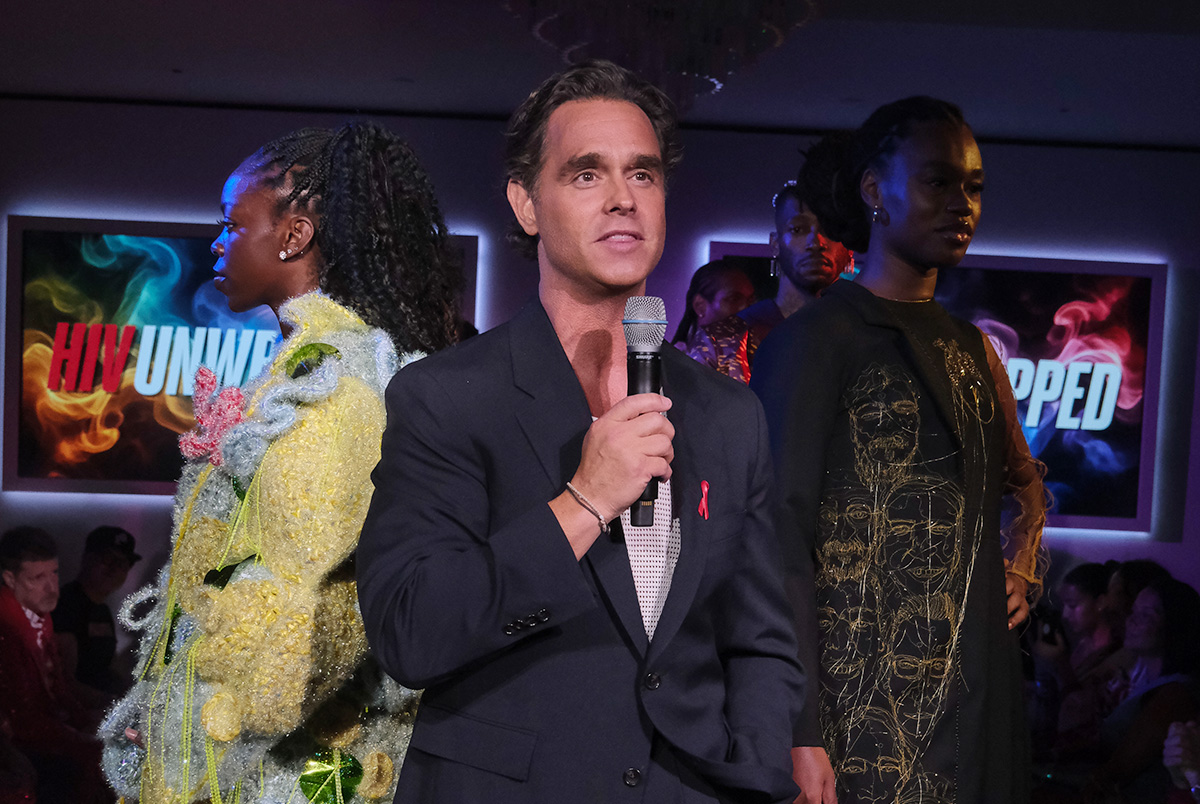
Karl Schmid has long been a staple in queer news and media. Hailing from Australia, Schmid grew accustomed to the limelight from a young age, and eventually made a successful transition into American network television through his work on red carpets for ABC.
In 2018, he would be thrust into the spotlight for a different reason. Despite repeated warnings from professional acquaintances, Schmid came out as HIV positive to share his story, wear down stigmas, and to educate people about important and misunderstood science like the concept of undetectable equals untransmittable.
And so, Schmid would grow accustomed to renewal. In 2019, he launched Plus Life Media, a platform that shares HIV resources, education, and stories of resilience from people living with HIV/AIDS. He was part of the team behind the Emmy-nominated short documentary, Marty’s Place: Where Hope Lives: an intimate look into a housing cooperative created in the 1990s to support people with HIV/AIDS. Late last week, he flew to New York for the U.S. debut of his latest initiative: HIV Unwrapped. The project pairs researchers and scientists in HIV studies with fashion design students, culminating in a runway show that features bold reimaginings and interpretations of crucial science.
The Blade spoke with Karl about the cross-pollination in his own life and career, and how his latest effort is shaping the way he blends activism and media to reinvigorate conversations around HIV/AIDS.
HIV Unwrapped feels like a really interesting pivot into a different kind of modality and platform for you. Can you tell me more about the initiative and how it fits into your legacy of activism and work?
Well, HIV Unwrapped came out of Australia and this wonderful activist named Brent Allan, who I’m good friends with. And Brent had been at, I think, the WorldPride, or something that was happening in Australia, and there was an exhibition where they paired some engineers and science people of varying professions with a fashion designer to try and illustrate their work.
And he thought, “Wow, what a great way to maybe try and interpret HIV science and reignite the conversation around HIV.” So it started in Melbourne, Australia, and it was successful there. And then they did a version in the UK earlier this year. And then in July for the International AIDS Conference that took place in Kigali, in Rwanda, they did a version.
And that’s kind of where I stepped in. I think with HIV Unwrapped, you’re drawn into the fashion first — and then the science comes. It’s just a really unique and different way of reframing the conversation about HIV. But beyond that, it’s also working with fashion students, young people, and to see them become so invested in HIV science. That’s what gets me the most excited. Because you’re opening a whole new world to a person who doesn’t maybe really think about HIV all that much, and now they’ve learned all this amazing stuff. Suddenly you’ve got a whole new bunch of people talking about HIV in exciting and fresh ways, and they’re telling their friends and they’re having conversations about it.
You’re trying to create different entry points for people to not only talk about the science behind HIV and AIDS, but also how we can reinterpret it in original and visually interesting ways.
I mean, look, you’ve got the House Appropriations Committee willing to advance this “Big Beautiful Bill” that slashes $2 billion in HIV funding in this country, and as someone living with HIV, you keep going, “Why would they do that? Why? We are so close to ending HIV.” All of a sudden, we’ve stopped funding research, and we’re stopping this, and I’m just like, “Why?”
Now more than ever, we’ve got people and politicians and government and a large part of the United States who think, “Oh yeah, HIV isn’t a thing anymore. It’s not important.” Well, it is still a thing. It is still important, and HIV Unwrapped is a way to be creative and open new avenues of dialogue.
A friend of mine sent me a handwritten note the other day. This is in Texas. One of his roommates wrote a handwritten note to another roommate, saying, “Oh, just so you know, ‘such and such’ has AIDS. So I’d be scrubbing the shower if I were you after he uses it. I personally have decided to go and shower at the gym.” And this is a person in their 30s, so we’re still having these dumb conversations from 1984.
That’s why I do what I do with Plus Life, and that’s why I’m like, “Wow, HIV Unwrapped is another tool in our toolbox we can use.” And I guess our hope is really that scientists will see this across the country and around the world and go, “Well, that is a really cool way to explain my science and make it accessible,” and want to engage in future projects like this.
How queer communities are represented in the media can leave deep imprints. I was watching an older interview you did where you recall this HIV ad you saw in a movie theater as a kid. The Grim Reaper’s there, and it’s creepy and sinister. It seems like we’ve moved away from that kind of imagery — but it doesn’t feel like we’ve necessarily come to a much better understanding of HIV/AIDS. Where do you think we’re at now in terms of representation?
The fact that, to this day, I can tell you where I was, what the movie was, that it was a Saturday, which cinema it was in, and I was a seven year old kid. It gives you an idea of how burned into my memory that is. And, I agree. I think we’ve moved away largely from the fear tactics, but we’ve stopped talking about it. I’d like to think that we’ve gotten better in representing people living with HIV, on television and film, as just people living with HIV. Where HIV doesn’t become the central storyline, and it’s not a doom and gloom, “woe is me” story. It’s just part of who they are.
But we sort of dance around anything that’s to do with our bodies or sex or sexuality, because it makes us uncomfortable. And so when I pitch stories to ABC and other networks, and even, quite frankly, trying to get press to cover HIV Unwrapped: we get passed on. People don’t want to talk to us because HIV isn’t sexy. As long as we keep doing that and having that reaction — if we don’t talk about it — we don’t get to a place where we can be comfortable with it.
Since I came out about my status all those years ago, my focus has been trying to normalize the conversation. That’s how we grow, and that’s how we learn — whether it’s HIV, whether it’s politics, whether it’s anything. But if we don’t talk about it, and we sort of pretend it doesn’t exist, and then we cut funding for it, and we sort of sweep it under the rug: it ain’t going to go anywhere.
Women of color, Black and brown women, have the highest infection rates in the United States. In the south those rates keep going up and up and up, and now we’re cutting funding to testing and to counseling and to services. I’m really worried that we will end up back with AIDS wards in hospitals again, and there’s no need for it.
To bring it back to HIV Unwrapped, that’s why, if I can come up and work with an amazing group of people to tell stories and to have conversations in fresh ways, then I’m going to keep doing it — whether it’s HIV Unwrapped, whether it’s what I do on Plus Life, whether it’s a television show or whatever crazy thing I come up with next.
It feels like there’s so much watering-down in terms of conversations around sexual health, HIV and AIDS. What is the resistance that you’ve faced, and how has that resistance changed over the years?
I’ve heard, “I think what you’re doing is great. It’s just not the right time to tell the story.” Well, when is the right time to tell the story? I think so many people in America think HIV doesn’t affect them. And the reality is very different. HIV affects everybody. If not now, when? People are still dying in this country. People are afraid to get tested, and they’re living in shame. And they’re hiding what’s wrong with them because of the stigma — and that just shouldn’t be happening.
I’ve said this a million times too. You know, HIV and AIDS doesn’t kill you. That’s not what’s going to put me in the grave. But it’s the stigma. It’s the bigoted, out-of-date opinions of Congress and politicians and public figures and uneducated people who just think this is somehow some deviant, dirty “sex disease” or drug disease, and those of us who get it deserve it. And you know, television networks, especially, are in the business of making money. And to do that, they sell advertising, and so they’re worried that advertisers will turn off if you talk about this kind of stuff.
And I think it’s maybe a little bit the opposite. I think if you can find, again, engaging and interesting ways to have real conversations, I’ve certainly found that you get a very vast and wide audience of people who will chime in and may have an opinion. And again, our opinions may differ, and that’s okay, but, but as long as we’re having the conversation, the more you say it, the less scary it is.
Almost 20 years after you were first diagnosed with HIV, do you see yourself pivoting now to work more on activism? Is that something you’re trying to focus more on now at this point of your career?
I will say that I’m incredibly fortunate to have worked for as many years as I have in broadcast, and I’ve done some really amazing things, and had some phenomenal opportunities going to the Oscars and doing all those red carpets and celebrity interviews all over the world. They’re all valuable experiences that I’ve been able to build upon. But I will say that in the last sort of two years, especially, my focus has become more about Plus Life and doing these kinds of stories and these kinds of initiatives.
I am fascinated by people. I think to be a decent journalist or broadcaster, you have to have that innate curiosity. And I am deeply curious about people and people’s behavior and where they come from, and what kind of homes they grew up in, what their friends are like. It’s incredibly satisfying to me. Do I miss being on regular, scheduled programming and television? Sure. It was a fantastic platform, and there’s nothing quite like the thrill of live television for me, and that’s why I loved being in news and entertainment news.
I think as I sort of get older, and I’m no longer the young kid on the block, and I’m not so nimble with my thumbs and my forefingers when it comes to putting stuff up on social media and Tik Tok and all of that…If I’ve got an opportunity to really hone in on the stuff that I do with Plus Life, there’s nothing more rewarding than that, right?
A behind-the-scenes documentary of the U.S. debut of HIV Unwrapped will be available to stream on November 30th, just before World AIDS Day.
AIDS and HIV
Assemblymembers urge Governor Newsom to sign “lifeline” bill for HIV medication
AB 554 amends existing law that restricts access to PrEP medication
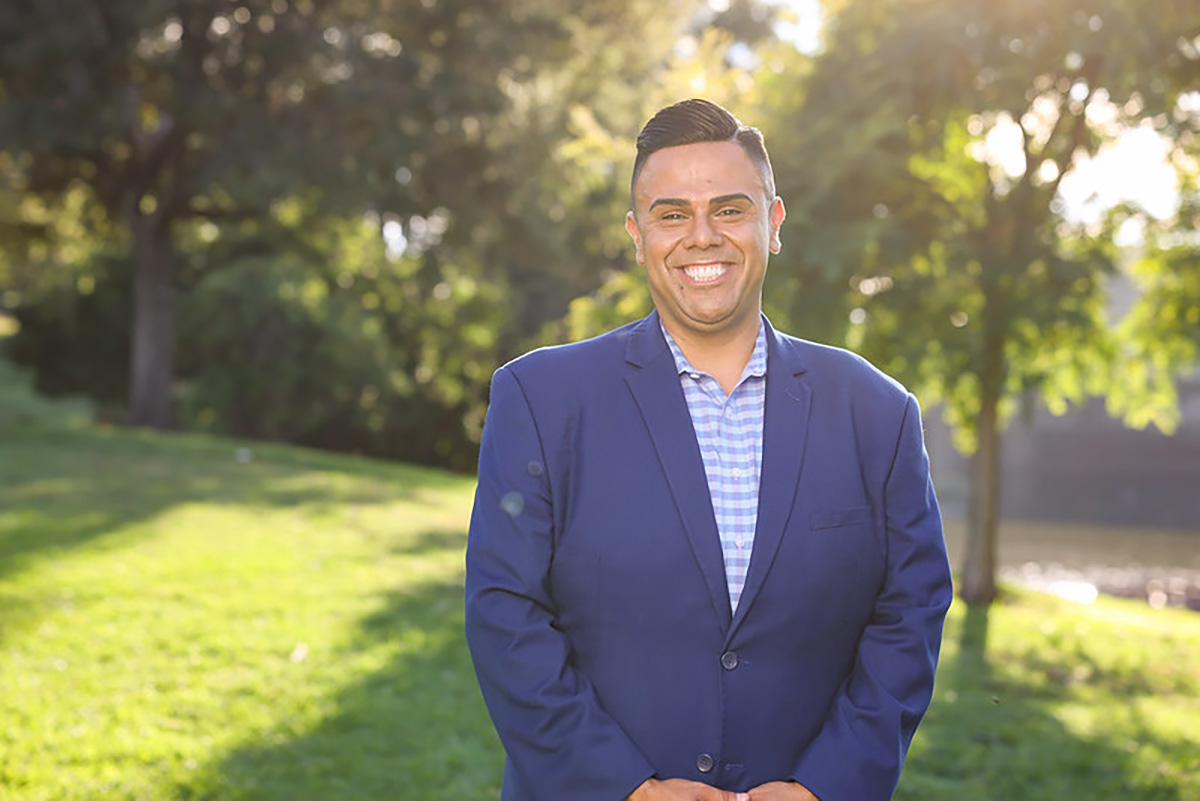
On September 10, Assembly Bill (AB) 554, or the PrEPARE Act (Protecting Rights, Expanding Prevention, and Advancing Reimbursement for Equity Act), was passed with a majority vote by the California State Assembly and Senate. Today, the bill’s leaders are urging Governor Newsom to sign it into law.
“With a powerful coalition behind AB 554, we were able to get this bill through the process swiftly, and are hopeful that the Governor will see the need for the LGBTQ+ community,” Los Angeles Assemblymember Mark Gonzalez, one of the bill’s co-authors, told the Blade.
AB 554 was first introduced in February, and was penned by Assemblymember Gonzalez and San Francisco Assemblymember Matt Haney. It was formed to amend existing laws around health insurance coverage that currently restrict access to certain antiretroviral drugs, or HIV preventative medicine like PrEP and PEP, and to ease difficulties community clinics face in administering these medications and receiving reimbursement. The bill will also require health care plans to cover FDA-approved HIV medication without enforcing prior authorization or step therapy.
For Gonzales and the bill’s supporters, AB 554 is about boosting access to various forms of effective HIV preventative medicine and providing a safeguard for people as the state of HIV research and treatment enters unsteady ground. This all comes in the midst of the debate around the House Committee on Appropriations’s 2026 Departments of Labor, Health and Human Services, and Education, and Related Agencies funding bill, which proposes $1.7 billion in cuts to domestic HIV prevention and research efforts, as well as programs that provide care for people living with HIV/AIDS — particularly, low-income people of color.
Assemblymember Gonzalez stated to the Blade that this is a “stark reminder that this epidemic still hits our communities of color the hardest,” and wants to address this by evolving and updating laws to reflect local needs. He is hopeful about the Governor’s impending response, and stated that the bill is “not just a policy; it is a lifeline.”
“It’s about giving people real choices, equipping small clinics with the tools they need to protect lives,” Gonzalez continued, “and ensuring that California continues to put public health over politics.”
AIDS and HIV
Local organization aims to support and assist Black LGBTQ+ community
REACH LA is stepping up their mission amid hostile administration
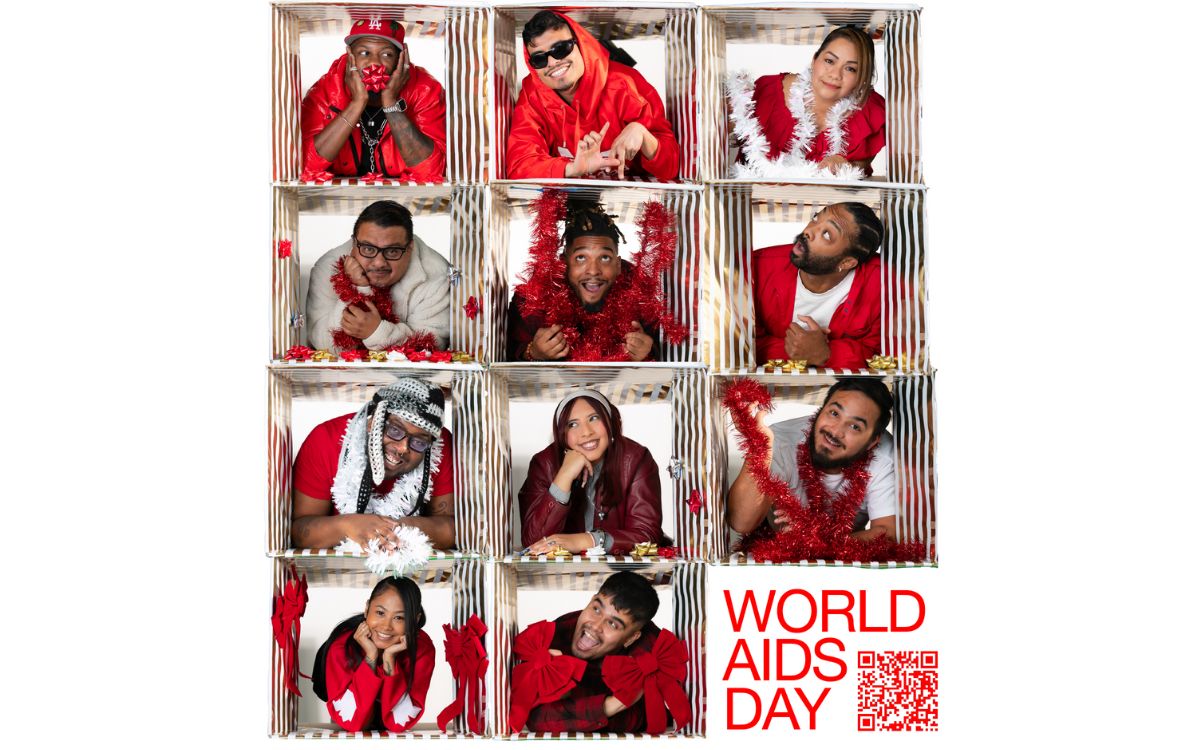
REACH LA, a Los Angeles-based nonprofit organization aimed at working with youth of color, is stepping up their prevention resources during Black History Month to support the LGBTQ+ community of color.
Though today is National Black HIV/AIDS Awareness Day, REACH LA works year-round to provide resources to their community members.
This month, the organization is amplifying its mission to support Black LGBTQ+ youth by offering free HIV testing and care throughout February, offering a $25 gift card as incentive to get tested. This and all of REACH LA’s efforts are geared toward assisting the marginalized Black and Latin American communities by reducing stigma, increasing education and assisting community members with resources.
The QTBIPOC community is especially vulnerable to political and personal attacks. As we head into the next four years under a hostile administration whose goal is to erase queer and trans people, there will be continued attacks on federal funding and on any other front possible.
“This year, it is especially vital, more than ever, to amplify and commemorate National Black HIV/AIDS Awareness Day. At REACH LA, we are currently engaging with individuals and partnerships while navigating through dire and uncertain times where HIV/AIDS awareness prevention efforts, access, and visibility have been under attack and restricted,” said Jeremiah Givens, chief marketing and communications officer at REACH LA.
It is important to spotlight the intersection between health equity, Black LGBTQ+ empowerment and community-based solutions during Black History Month and every other month throughout the year and especially during this particularly vulnerable time.
As one of eight CDC PACT Program Partners, REACH LA celebrates National Black HIV/AIDS Awareness Day with a Positive Living Campaign in collaboration with the CDC’s Let’s Stop HIV Together initiative. The campaign highlights the resilience of individuals living with HIV and works to raise awareness and foster community support.
To learn more about resources, visit their website or stop in for testing, support and other resources. The organization’s doors are open Monday through Friday, from 11 AM to 7 PM for free, on-site HIV testing and assistance with accessing PREP and PEP, linkage to care and free mental health therapy.

Over 300 people gathered last Monday to commemorate World AIDS Day in an event hosted by Bienestar Human Services. The non-profit focuses on identifying and addressing emerging health issues faced by Latinx and Lesbian, Gay, Bisexual, Trans Queer and more (LGBTQ+) populations.
The main objective of the annual event was to light a candle to honor those who passed away due to Human Immunodeficiency Virus (HIV) and celebrate those who, despite the condition, keep going.
HIV is the virus that causes Acquired Immune Deficiency Syndrome (AIDS). Once you have HIV, the virus stays in the body for life, and while there is no cure. There is, however, medicine that can help people stay healthy, states Planned Parenthood. HIV destroys the cells that protect the human body from infections. If a person doesn’t have enough of these CD4 or T cells, the body can’t fight off infections as normal. This damage can lead to AIDS, which is the most serious stage of HIV, and it leads to death over time.
In the U.S., there are about 1.3 million people newly infected with HIV in 2023 and 39.9 million living with HIV, according to the Joint United Nations Programme on HIV/AIDS.
Living with HIV for decades
Among the participants at the event at the Ukrainian Culture Center on Melrose in East Hollywood was Marcela, a transgender woman who was diagnosed HIV positive 33 years ago. She said when she learned about her diagnosis, she was so depressed she tried to commit suicide. She ended up at the hospital, and after getting better, she heard about an organization that was helping people with health issues such as hers.
“Since then, I learned to live with this condition because it is not an illness; it’s a condition,” she said.

Bienestar celebrated the World AIDS Day on December 2, 2024. (Courtesy of Bienestar)
Marcela, who didn’t provide her last name, said she not only found a new way of living with HIV but also found an extended family at Bienestar. They have guided her on how to receive the proper treatment and medicines, to be part of a support group and even to pay her rent when she needed it the most.
The 64-year-old woman doesn’t have any family members in the United States. She said five years ago, her husband passed away of pneumonia. She was living alone in Long Beach and got behind her payments during the pandemic. She said Bienestar helped her apply for a grant of over $20,000 that secured the payment for her rent, and now she is debt-free.
“I’m extremely grateful to them and all the help they provide,” she said.
Working for the community
This year, Bienestar is celebrating 35 years of serving the LGBTQ+ community. Among the many programs they offer is the Support Group for Transgender Women, which Marcela belongs to.
Mia Perez, the support group manager, said 15 to 20 members attend the group every Friday from 3 to 5 p.m. They talk about their feelings, share experiences, and plan and participate in social events.
Perez said one of the participants’ biggest concerns is accepting reality once they have been diagnosed. “However, with all these new treatments people that are HIV positive can have a normal relationship with someone who doesn’t have HIV. It’s all about getting informed,” said Perez.
Other concerns include what will happen to them once the new presidential administration takes office since they have plans to deport immigrants and many of the transgender women are immigrants.
“That’s why we are trying to get in contact with an immigration attorney or an organization so they can keep them informed of their rights,” said Perez.
Bienestar events, like World AIDS Day, help those affected create a stronger community, and they realize the recognition is not just for those who are HIV positive but also for their families and friends.
Marcela said when she is feeling down or bored at home, all she has to do is go to Bienestar and the people there always give her a warm welcome.
“They give me coffee, they offer me lunch. Being there is like being at home,” she said.
AIDS and HIV
New monument in West Hollywood will honor lives lost to AIDS
In 1985, WeHo sponsored one of the first awareness campaigns in the country, nationally and globally becoming a model city for the response to the epidemic

December is AIDS/HIV awareness month and this year West Hollywood is honoring the lives lost, by breaking ground on a project in West Hollywood Park that has been in the works since 2012.
Members of Hollywood’s City Council joined representatives from the Foundation of AIDS Monument to announce the commencement of the construction of STORIES: The AIDS Monument, which will memorialize 32 million lives lost. This monument, created by artist Daniel Tobin, will represent the rich history of Los Angeles where many of those afflicted with HIV/AIDS lived out their final days in support of their community.
Tobin is a co-founder and creative director of Urban Art Projects, which creates public art programs that humanize cities by embedding creativity into local communities.
The motto for the monument is posted on the website announcing the project.
“The AIDS Monument:
REMEMBERS those we lost, those who survived, the protests and vigils, the caregivers.
CELEBRATES those who step up when others step away.
EDUCATES future generations through lessons learned.”
The monument will feature a plaza with a donor wall, vertical bronze ‘traces’ with narrative text, integrated lighting resembling a candlelight vigil, and a podium facing North San Vicente Blvd.
World AIDS Day, which just passed, is on December 1st since the World Health Organization declared it an international day for global health in 1988 to honor the lives lost to HIV/AIDS.
The Foundation for the AIDS monument aims to chronicle the epidemic to be preserved for younger generations to learn the history and memorialize the voices that arose during this time.
The HIV/AIDS epidemic particularly affected people in Hollywood during the onset of the epidemic in the 1980s. The epidemic caused a devastatingly high number of deaths in the city. The city then became one of the first government entities to provide social service grants to local AIDS and HIV organizations.
In 1985, the city sponsored one of the first awareness campaigns in the country, nationally and globally becoming a model city for the response to the epidemic.
Earlier this year, the U.S. Centers for Disease Control and Prevention released the theme for World AIDS Day, ‘Collective Action: Sustain and Accelerate HIV Progress.’
The city of West Hollywood continues to strive to become a HIV Zero city with its current implementation of HIV Zero Initiative. The initiative embraces a vision to “Get to Zero” on many fronts: zero new infections, zero progression of HIV to AIDS, zero discrimination and zero stigma.
Along with the initiative and the new AIDS monument, the city also provides ongoing support and programming through events for World AIDS Day and the annual AIDS Memorial Walk in partnership with the Alliance for Housing and Healing.
For more information, please visit www.weho.org/services/human-services/hiv-aids-resources.
AIDS and HIV
National Latino AIDS Awareness Day: Breaking down stigma, silence and silos
FLAS provides HIV and STD education
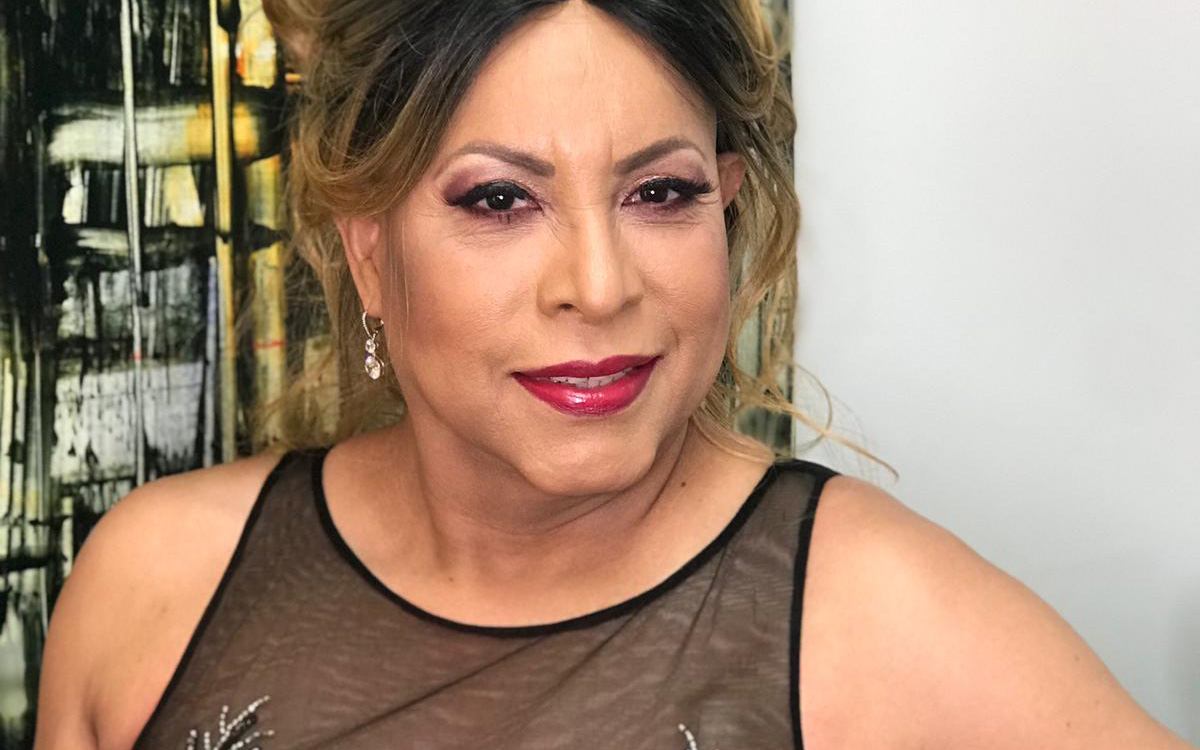
When Elia Chino, Founder and Executive Director of the Fundacion Latinoamericana De Acción Social (FLAS) Inc., initially approached major HIV/AIDS agencies in Houston, Texas for support in starting an organization tailored specifically to reaching Latino populations, she was met with confusion.
“Why do you want to start a separate organization?” they asked. “We’re here!”
Chino remembers her frustration. “They didn’t understand,” she said. “Our brothers and sisters were dying, and the community needed services that they couldn’t provide.”
Indeed, in the 1990s, barriers to HIV care and treatment for Latino populations were markedly different from those faced by other populations. Information about the HIV epidemic was largely in English, and inaccessible to many individuals who had immigrated from indigenous Latin American communities and never learned to read and write in their native language, let alone English. When they were able to access treatment, Latino individuals often faced mistreatment at primary care facilities due to a lack of culturally competent care.
Perhaps most challenging was the culture of silence. Many Latino immigrants living with HIV in the United States fled homophobia, transphobia and stigma in their home countries, and were still grappling with lasting shame and guilt. Despite many people dying, there was little open discussion or education about the cause. In fact, Chino didn’t even know that the HIV epidemic took the lives of some of her best friends until speaking with their families years later.
“No one was talking about their diagnosis,” says Chino. “People had come to the United States for freedom, but still weren’t ready to talk about who they were. There was a real atmosphere of stigma, taboo, misinformation and fear.”
At the time, Chino was volunteering at a hospital serving communities without insurance. The fourth, fifth and sixth floors were all dedicated to treating people with HIV. Chino began educating herself on this crisis while she volunteered at the hospital, and founded FLAS in 1994 after discovering that the majority of HIV prevention efforts were not reaching Latino individuals.
In the beginning, without support from other organizations in the area or resources to expand, Chino was a one-woman show, conducting outreach in clubs, cantinas and bars by herself. She hadn’t anticipated the barriers she’d face as a member of the LGBTQ+ community and an immigrant. Horrible discrimination, a language barrier and intense HIV stigma in the communities she was working in made the work challenging, but also emphasized the necessity of what she was doing.
Over time, with support and funding from organizations like Gilead Sciences, FLAS has been able to expand its services from solely HIV prevention to include HIV testing, behavioral health services, housing and social services assistance, support groups and a food pantry. The organization has started hosting educational events everywhere from churches to street corners, raising awareness about HIV in the Houston community. Chino also started collaborating with the consulate of Mexico to help newcomers navigate U.S. health systems and services when they arrive in the United States. Next year, the organization will start offering mobile HIV testing clinics for communities in need.
Since its launch, FLAS has been able to expand its initial focus to address the holistic drivers of this crisis, moving beyond medical determinants of health to tackle the social and structural barriers that perpetuate the HIV epidemic and prevent Latino populations from accessing comprehensive treatment.
“Everyone keeps telling Latino individuals to get tested, but this does nothing unless you actually incentivize people to do so,” says Chino. “People have to go to work. They have to pay their rent. They have to buy food. Many can’t afford to lose their salary and spend a full day coming in to do a test or get treatment. We have to make it easier to access HIV prevention and treatment, and we have to provide incentives.”
This year marked FLAS’s 30th anniversary, which the organization celebrated with a gala in August. They have made a huge impact in Houston since their launch – providing HIV and STD education to over 500,000 Latino people, distributing over 20,000 HIV tests, referring over 40,000 people for social services and hosting over 6,000 educational events and health fairs in English and Spanish. However, many of the challenges for HIV prevention and treatment for Latino populations remain.
“We have over 30,000 individuals living with HIV in Houston, yet when we ask for people to talk about their status, no one comes forward to tell their stories. HIV is a chronic disease, but stigmatization is still so strong in the Latino community,” says Chino. “You can say you have cancer, high blood pressure, diabetes, whatever – but nobody says I have HIV. There is still so much work to do.”
As a testament to their important programming, FLAS is a recipient of funding through Gilead Sciences’ TRANScend® Community Impact Fund, a program aimed at empowering Trans-led organizations working to improve the safety, health and wellness of the Transgender community. Since its inception in 2019, TRANScend has awarded more than $9.2 million in grants to 26 community organizations across 15 U.S. states and territories.
TRANScend support has been critical to helping FLAS maintain its services. In 2020, in the midst of the COVID pandemic, Gilead’s funding helped FLAS continue to offer virtual behavioral and mental health services to the community when their physical offices had to close.
According to Chino, this type of partnership is critical to ending the HIV epidemic in Latino communities, especially for meeting communities where they are.
“Communities trust their grassroots organizations, and grassroots organizations provide for their communities,” she says. “At the end of the day, we need to continue to support the groups doing the difficult work on the ground with the people they’re serving, especially those breaking down stigma and lasting barriers to care for Latino communities.”
AIDS and HIV
40th anniversary AIDS Walk happening this weekend in West Hollywood
AIDS Project Los Angeles Health will gather in West Hollywood Park to kick off 40th anniversary celebration
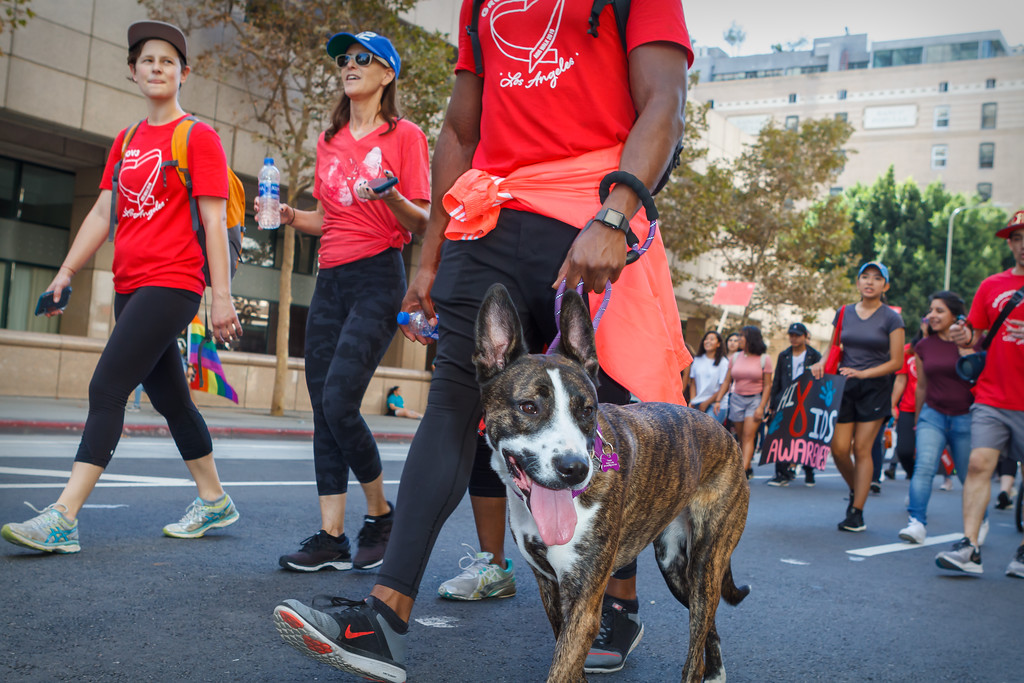
APLA Health will celebrate its 40th anniversary this Sunday at West Hollywood Park, by kicking off the world’s first and oldest AIDS walk with a special appearance by Salina Estitties, live entertainment, and speeches.
APLA Health, which was formerly known as AIDS Project Los Angeles, serves the underserved LGBTQ+ communities of Los Angeles by providing them with resources.
“We are steadfast in our efforts to end the HIV epidemic in our lifetime. Through the use of tools like PrEP and PEP, the science of ‘undetectable equals intransmissible,’ and our working to ensure broad access to LGTBQ+ empowering healthcare, we can make a real step forward in the fight to end this disease,” said APLA Health’s chief executive officer, Craig E. Thompson.
For 40 years, APLA Health has spearheaded programs, facilitated healthcare check-ups and provided other essential services to nearly 20,000 members of the LGBTQ+ community annually in Los Angeles, regardless of their ability to pay.
APLA Health provides LGBTQ+ primary care, dental care, behavioral healthcare, HIV specialty care, and other support services for housing and nutritional needs.
The AIDS Walk will begin at 10AM and registrations are open for teams and solo walkers. More information can be found on the APLA Health’s website.
AIDS and HIV
Cautious Optimism in San Francisco as New Cases of HIV in Latinos Decrease
The decrease could mark the first time in five years that Latinos haven’t accounted for the largest number of new cases
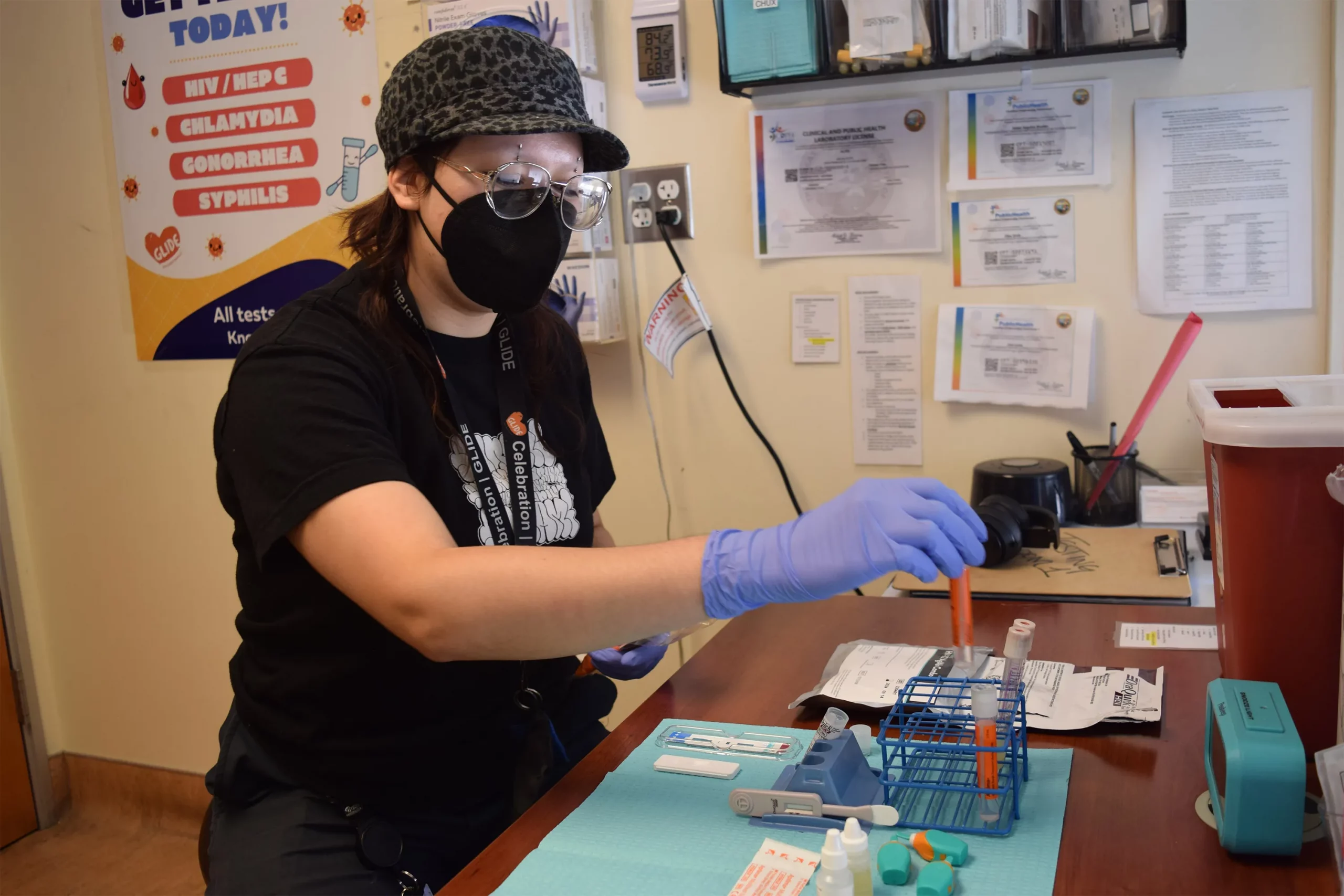
SAN FRANCISCO — For years, Latinos represented the biggest share of new HIV cases in this city, but testing data suggests the tide may be turning.
The number of Latinos newly testing positive for HIV dropped 46% from 2022 to 2023, according to a preliminary report released in July by the San Francisco Department of Public Health.
The decrease could mark the first time in five years that Latinos haven’t accounted for the largest number of new cases, leading to cautious optimism that the millions of dollars the city has spent to remedy the troubling disparity is working. But outreach workers and health care providers say that work still needs to be done to prevent, and to test, for HIV, especially among new immigrants.
“I am very hopeful, but that doesn’t mean that we’re going to let up in any way on our efforts,” said Stephanie Cohen, who is the medical director of the city’s HIV and STI prevention division.
Public health experts said the city’s latest report could be encouraging, but that more data is needed to know whether San Francisco has addressed inequities in its HIV services. For instance, it’s still unclear how many Latinos were tested or if the number of Latinos exposed to the virus had also fallen — key health metrics the public health department declined to provide to KFF Health News. Testing rates are also below pre-pandemic levels, according to the city.
“If there are fewer Latinos being reached by testing efforts despite a need, that points to a serious challenge to addressing HIV,” said Lindsey Dawson, the associate director of HIV Policy and director of LGBTQ Health Policy at KFF, a health information nonprofit that includes KFF Health News.
San Francisco, like the rest of the country, suffers major disparities in diagnosis rates for Latinos and people of color. Outreach workers say that recent immigrants are more vulnerable to infectious diseases because they don’t know where to get tested or have a hard time navigating the health care system.
In 2022, Latinos represented 44% of new HIV cases in San Francisco, even though they accounted for only 15% of the population. Latinos’ share of new cases fell to 30% last year, while whites accounted for the largest share of new cases at 36%, according to the new report.
Cohen acknowledged a one-year decline is not enough to draw a trend, but she said targeted funding to community-based organizations may have helped lower HIV cases among Latinos. A final report is expected in the fall.
Most cities primarily depend on federal dollars to pay for HIV services, but San Francisco has an ambitious target to be the first U.S. city to eliminate HIV, and roughly half of its $44 million HIV/AIDS budget last year came from city coffers. By comparison, New Orleans, which has similar HIV rates, kicked in only $22,000 of its $13 million overall HIV/AIDS budget, according to that city’s health department.
As part of an effort to address HIV disparities among LGBTQ+ communities and people of color, San Francisco last year gave $2.1 million to three nonprofits — Instituto Familiar de la Raza, Mission Neighborhood Health Center, and San Francisco AIDS Foundation — to bolster outreach, testing, and treatment among Latinos, according to the city’s 2023 budget.
At Instituto Familiar de la Raza, which administers the contract, the funding has helped pay for HIV testing, prevention, treatment, outreach events, counseling, and immigration legal services, said Claudia Cabrera-Lara, director of the HIV program at Sí a la Vida. But ongoing funding isn’t guaranteed.
“We live with the anxiety of not knowing what is going to happen,” she said.
The public health department has commissioned a $150,000 project with Instituto Familiar de la Raza to determine how Latinos are contracting HIV, who is most at risk, and what health gaps remain. The results are expected in September.
“It could help us shape, pivot, and grow our programs in a way that makes them as effective as possible,” Cohen said.
The center of the HIV epidemic in the mid-1980s, San Francisco set a national model for response to the disease after building a network of HIV services for residents to get free or low-cost HIV testing, as well as treatment, regardless of health insurance or immigration status.
Although city testing data showed that new cases among Latinos declined last year, outreach workers are seeing the opposite. They say they are encountering more Latinos diagnosed with HIV while they struggle to get out information about testing and prevention — such as taking preventive medications like PrEP — especially among the young and gay immigrant communities.
San Francisco’s 2022 epidemiological data shows that 95 of the 213 people diagnosed at an advanced stage of the virus were foreign-born. And the diagnosis rate among Latino men was four times as high as the rate for white men, and 1.2 times that of Black men.
“It’s a tragedy,” said Carina Marquez, associate professor of medicine in the Division of HIV, Infectious Diseases, and Global Medicine at Zuckerberg San Francisco General Hospital, the city’s largest provider of HIV care. “We have such great tools to prevent HIV and to treat HIV, but we are seeing this big disparity.”
Because Latinos are the ethnicity least likely to receive care in San Francisco, outreach workers want the city to increase funding to continue to reduce HIV disparities.
The San Francisco AIDS Foundation, for instance, would like more bilingual sexual health outreach workers; it currently has four, to cover areas where Latinos have recently settled, said Jorge Zepeda, its director of Latine Health Services.
At Mission Neighborhood Health Center, which runs Clinica Esperanza, one of the largest providers of HIV care to Latinos and immigrants, the number of patients seeking treatment has jumped from about two a month to around 16 a month.
Among the challenges is getting patients connected to mental health and substance abuse bilingual services crucial to retaining them in HIV care, said Luis Carlos Ruiz Perez, the clinic’s HIV medical case manager. The clinic wants to advertise its testing and treatment services more but lacks the money.
“A lot of people don’t know what resources are available. Period,” said Liz Oates, a health systems navigator from Glide Foundation, who works on HIV prevention and testing. “So where do you start when nobody’s engaging you?”
This article was produced by KFF Health News, which publishes California Healthline, an editorially independent service of the California Health Care Foundation.
KFF Health News is a national newsroom that produces in-depth journalism about health issues and is one of the core operating programs at KFF—an independent source of health policy research, polling, and journalism. Learn more about KFF.
Subscribe to KFF Health News’ free Morning Briefing.
-

 Los Angeles3 days ago
Los Angeles3 days agoSouth L.A. celebrated Black joy and resistance at yesterday’s Martin Luther King Jr. Day Parade
-

 Features4 days ago
Features4 days agoLiliana T. Pérez-Palacios uplifts BIPOC, immigrant and queer rights with the L.A. Chargers
-

 Commentary5 days ago
Commentary5 days agoWhat do we sacrifice to get laid?
-
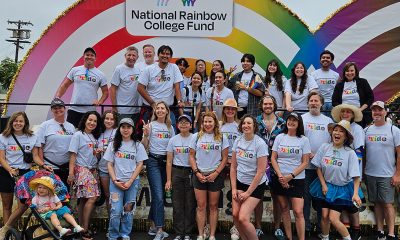
 LGBTQ+ Youth Mental Health19 hours ago
LGBTQ+ Youth Mental Health19 hours agoThe National Rainbow College Fund will grant $2,500 to 200 LGBTQ+ students: out or not
-

 Movies20 hours ago
Movies20 hours agoFew openly queer nominees land Oscar nominations as ‘Sinners’ and ‘One Battle After Another’ lead the pack

